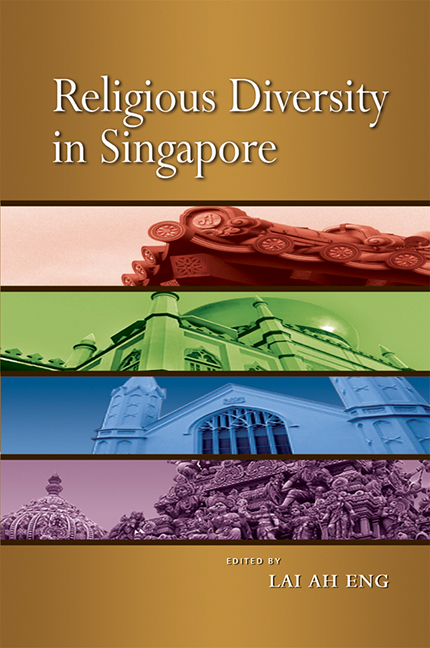Book contents
- Frontmatter
- Contents
- List of Figures and Tables
- List of Appendices
- FOREWORD
- PREFACE
- Acknowledgements
- The Contributors
- Abbreviations
- Glossary
- INTRODUCTION
- PART I The Landscape of Religious Diversity
- PART II Religion in Schools and Among the Young
- 13 From Moral Values to Citizenship Education: The Teaching of Religion in Singapore Schools
- 14 Religious Education as Locus of Curriculum: A Brief Inquiry into Madrasah Curriculum in Singapore
- 15 Mission Schools in Singapore: Religious Harmony, Social Identities, and the Negotiation of Evangelical Cultures
- 16 Religious Switching and Knowledge among Adolescents in Singapore
- PART III Religion in the Media
- PART IV Religious Organizations in Social Services
- PART V Interfaith Issues and Interaction
- Index
16 - Religious Switching and Knowledge among Adolescents in Singapore
from PART II - Religion in Schools and Among the Young
Published online by Cambridge University Press: 21 October 2015
- Frontmatter
- Contents
- List of Figures and Tables
- List of Appendices
- FOREWORD
- PREFACE
- Acknowledgements
- The Contributors
- Abbreviations
- Glossary
- INTRODUCTION
- PART I The Landscape of Religious Diversity
- PART II Religion in Schools and Among the Young
- 13 From Moral Values to Citizenship Education: The Teaching of Religion in Singapore Schools
- 14 Religious Education as Locus of Curriculum: A Brief Inquiry into Madrasah Curriculum in Singapore
- 15 Mission Schools in Singapore: Religious Harmony, Social Identities, and the Negotiation of Evangelical Cultures
- 16 Religious Switching and Knowledge among Adolescents in Singapore
- PART III Religion in the Media
- PART IV Religious Organizations in Social Services
- PART V Interfaith Issues and Interaction
- Index
Summary
INTRODUCTION
A study of religion in adolescence is important because today's youths are the adults of tomorrow — their behaviour, attitudes and beliefs affect the political, economic and social future of a nation. Adolescence is characterized by many biological, cognitive and social changes which constitute a transition into adult life. Growth can spur changes in how adolescents are viewed and treated by their parents and peers as well as changes in how adolescents view themselves and are viewed and treated by their parents, peers and others. It is a period when they not only encounter society's expectations of them, but also have a strong need to find intimacy and friends. Religion or more generally, religiosity begins to play a large part upon how these potential adults view the world. Important questions pertaining to identity and meaning begin to surface. However, research on religious development in adolescence is a much neglected area, as can be observed by the lack of research and surveys available until recently.
Tong (2002) has documented anthropological and sociological studies on Hinduism, Christianity, Hinduism and Chinese religion in Singapore written in English in the last 150 years. These studies have mostly focused on more apparent aspects such as rituals or festivals. Although Christianity is practised by only 14.6 per cent (Leow 2001) of the population, more research has been undertaken on it than on other religions. However, these studies have been more of religious sociology rather than the sociology of religion. In all these, very few systematic surveys or studies were undertaken and as far as this writer is aware, no research on religious switching among the adolescent school-going population has been documented. There has been however, some research of religious conversion among students in tertiary institutions, but mostly on Christianity and Buddhism (for example, Tamney and Hassan 1987). Hence, this study appears to be the first such study and is thus important although preliminary and exploratory in nature. A reason for the scarcity of research on this area is because studies of switching or conversion have received little respect from scholars since they are often assumed to be a supernatural phenomenon.
- Type
- Chapter
- Information
- Religious Diversity in Singapore , pp. 381 - 410Publisher: ISEAS–Yusof Ishak InstitutePrint publication year: 2008



